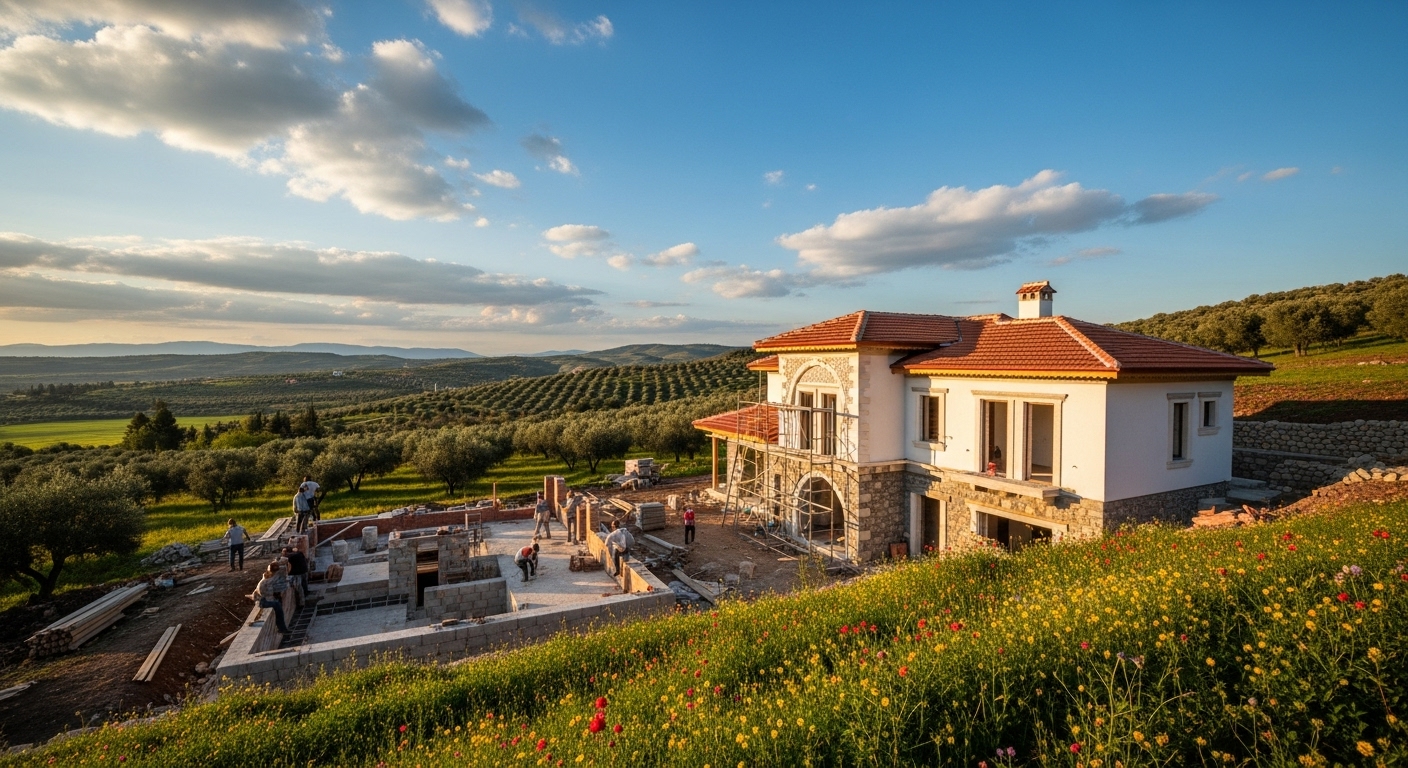Building a House in Turkey: The Ultimate Guide for 2025
Discover everything you need to know about building your dream house in Turkey, from buying land and permits to design trends and insider tips for a smooth experience.

1. Introduction: Why Build a House in Turkey?
Turkey isn’t just a holiday paradise; it’s increasingly becoming a dream destination for people looking to build their forever home or a profitable vacation property. The country offers a fascinating blend of East and West, with stunning coastlines, rich cultural heritage, and a lifestyle that balances modern comforts with traditional charm. Over the past decade, many expats from Europe, the Middle East, and even North America have been flocking here — not just to buy ready-made apartments but to craft custom-built villas and country homes that match their exact tastes.
Building instead of buying can be a game-changer. For one, you get complete control over the design, materials, and layout, ensuring every square meter suits your needs. It’s often cheaper too! In many Turkish regions, buying land and building can cost significantly less than purchasing a finished house, especially in tourist hotspots like Antalya or Bodrum. Plus, with proper planning, your investment can appreciate rapidly as Turkey’s property market continues to grow. In this guide, you’ll find everything you need — from legal basics to hidden costs and the joys (and headaches) of Turkish construction — so you can build confidently and avoid costly mistakes.
2. Understanding Turkish Property Laws for Foreigners
Before you dive into building your Turkish dream home, it’s crucial to understand what’s legally allowed. Good news: foreigners can own property in Turkey, but there are a few important limitations. According to Turkish law, citizens of most countries can purchase up to 30 hectares (about 74 acres) of land. However, you cannot own property in military or strategically sensitive zones — so always double-check the location with a licensed lawyer or real estate expert.
Another key detail is that you must follow reciprocity agreements. This means your country must allow Turkish citizens to buy property there; otherwise, you may face restrictions. Once you confirm eligibility, you’ll work with a notary and land registry office to transfer the title deed, known locally as a Tapu. Without this document, you have no legal claim over the land. Also, note that Turkey has cracked down on illegal construction, so building without a permit can lead to steep fines or even demolition. Understanding these laws upfront saves headaches and helps you build legally and stress-free.
3. Choosing the Right Location
Choosing where to build is arguably the most critical decision. Turkey is diverse — from vibrant coastal towns to quiet mountain villages. Each region offers something unique. For instance, Antalya, Fethiye, and Bodrum are hugely popular with foreigners for their warm climates, modern amenities, and vibrant expat communities. If you crave bustling city life, Istanbul’s suburbs may be ideal, while those seeking peace might prefer villages in the Aegean or Black Sea regions.
Urban vs. rural? Urban areas mean higher costs but better infrastructure and resale value. Rural spots are cheaper and offer larger plots, but getting utilities and building permissions may take longer. Also, consider the local climate: the Mediterranean and Aegean coasts offer hot, dry summers and mild winters, while central regions like Cappadocia have harsh winters. Think about proximity to airports, hospitals, and schools if you plan to live there year-round. In short, your choice of location will shape not just your house, but your entire lifestyle in Turkey.
4. Budgeting Your Dream House
How much will it cost to build a house in Turkey? The answer depends on your location, size, materials, and finishes. On average, expect to spend around $400–$800 per square meter for mid-range quality. Luxury villas with custom pools or imported marble can easily hit $1,000+ per square meter. So, a comfortable 150 m² house may cost around $75,000–$150,000 to build — excluding the land price.
But there’s more: hidden costs can surprise you if you’re not careful. Fees for architects, legal paperwork, permits, and utility hookups add up quickly. Also, keep a cushion for exchange rate fluctuations and unexpected construction delays. Financing is another factor; some Turkish banks offer mortgages to foreigners, but terms vary and often require a significant down payment. Many people prefer to self-finance or use savings. Before you break ground, build a detailed budget, talk to locals who have built homes, and consult with reputable builders — this preparation will save you time, money, and plenty of sleepless nights.
5. Finding and Purchasing Land
Finding the right plot of land is an adventure in itself. Many foreigners work with local real estate agents who specialize in serving expats — they know the legal process and can guide you to areas where foreigners can legally buy. Make sure the plot is within the buildable zone, known as the Imar Planı. Land classified as agricultural often cannot legally host a house, so double-check!
Before signing anything, hire an independent lawyer to run a thorough title search. They’ll confirm there are no debts or legal disputes tied to the land. Once satisfied, you’ll pay a deposit and sign a purchase contract, then finalize the deal at the local Tapu office. Always insist on seeing the original title deed and verifying it with the Land Registry. And don’t forget the transfer tax — typically about 4% of the declared value. Once the land is yours, you’re one big step closer to your Turkish dream home.
6. Designing Your House
Designing your dream house in Turkey is where the fun really begins. After you’ve secured your land, the next step is turning your vision into blueprints that comply with Turkish building regulations while reflecting your personal style. Hiring an experienced local architect is crucial — they’ll not only draw up the plans but also navigate the maze of local laws, zoning restrictions, and municipal requirements.
Turkish architecture blends tradition with modernity beautifully. Many expats opt for a mix of local stonework, tiled roofs, and wide terraces that suit the climate, paired with contemporary interior layouts. Want a modern villa with floor-to-ceiling windows? No problem. Prefer a rustic farmhouse style with wooden beams and a fireplace? Totally doable. Don’t overlook functionality either: think about insulation (winters can get surprisingly cold), earthquake resistance (mandatory in many zones), and efficient heating and cooling systems.
Eco-friendly designs are trending too. Solar panels, rainwater harvesting, and high-efficiency insulation help reduce your long-term bills and carbon footprint. Discuss these features with your architect early — it’s much cheaper to integrate them during the design stage than to add them later. Remember, your plans must get approval from the local municipality before construction starts, so work closely with your architect to ensure every detail aligns with local standards and your dream aesthetic.
7. Navigating Permits and Legal Requirements
Turkey’s construction bureaucracy can feel daunting, but with the right team, it’s manageable. Once you have your blueprints, your architect typically submits them to the local municipality for approval. They check that your design follows zoning laws, adheres to safety codes (especially for earthquakes), and fits the neighborhood’s overall plan.
You’ll need a Building Permit (Yapı Ruhsatı) — without it, construction is illegal, and authorities can halt your project or order demolition. After getting this permit, you’ll also need regular inspections at various stages: foundation, structural frame, electrical systems, and final sign-off. Inspections help ensure that builders follow the approved plans and use proper materials.
Common mistakes? Starting construction before securing the permit or assuming verbal approvals are enough. In Turkey, paperwork rules everything. Also, keep in mind that changes to your design mid-construction often require new approvals, which can delay your timeline and cost more. So, double-check everything beforehand and hire a local lawyer or consultant to handle the paperwork if you don’t speak Turkish fluently. This upfront diligence guarantees a smoother, stress-free building process.
8. Hiring Builders and Contractors
Your builders and contractors can make or break your house-building experience. Reliable, skilled teams deliver quality work on time and within budget, while poor contractors can leave you with costly repairs and endless stress. So, how do you find the right people?
Start with recommendations. Talk to neighbors, expats, or local architects. Good builders usually have portfolios and references — check them! Get at least three quotes and don’t automatically pick the cheapest one; low prices often mean cutting corners or surprise fees later. Insist on a detailed written contract covering scope of work, materials, payment schedule, and a timeline. Turkish construction contracts can be tricky, so have a bilingual lawyer review everything before signing.
Payment is typically done in stages — an initial deposit, followed by progress payments as each phase completes. Never pay the full amount upfront. Visit the site regularly or hire an independent inspector to ensure work meets your standards. Open communication is key; misunderstandings can happen due to language barriers or different work styles, so clarify expectations clearly and keep everything in writing. Investing time in finding the right builder pays off big time in the form of a safe, beautiful home you’ll love for years to come.
9. Interior Design and Finishing Touches
With the structure complete, it’s time to make your house feel like a home. Interior design in Turkey offers endless inspiration — from luxurious Ottoman influences to sleek European minimalism. Many foreigners enjoy combining local craftsmanship, like hand-carved wood doors or colorful Iznik tiles, with modern furniture and smart home features.
Shopping for materials is an adventure in itself. Turkey has fantastic local stone, ceramics, and textiles at reasonable prices. Visit local markets or specialized showrooms for unique finds. If you prefer imported brands, major cities have plenty of international suppliers, but prices can be higher due to import taxes.
Don’t forget the garden! A well-planned outdoor space is a big part of Turkish living, especially in warmer coastal regions. Think pergolas, olive trees, and maybe even a private pool or barbecue area for entertaining friends and family. Lastly, plan your finishing timeline wisely. Turkish builders might need extra time for custom orders, and some expats report delays in furniture deliveries or custom-made fittings. Patience and a good interior designer will help you turn your new build into a cozy, personalized haven.
10. Moving In and Living in Your New Turkish Home
Congratulations — you’ve built your dream house! But moving in comes with its own checklist. First, get utilities like electricity, water, and natural gas connected; your builder usually helps with the paperwork. Internet providers are abundant, and many offer English-speaking customer service in major cities and expat-friendly towns.
Next, handle local taxes. Homeowners pay an annual property tax, which is quite reasonable compared to many Western countries. Register your address at the local Nüfus Müdürlüğü (Population Directorate) — it’s mandatory and needed for things like residency permits and voting (if you become a citizen).
Integrating into your new community is perhaps the most rewarding part. Turkish neighbors are famously friendly and curious, and you’ll find that a few words in Turkish go a long way. Join local clubs, visit village markets, and invite your neighbors for tea. Before you know it, you’ll feel like a local yourself. Finally, remember that homes in Turkey, like anywhere, need regular upkeep. Plan for annual maintenance, seasonal checks (especially for roofs and pipes), and maybe hire a trusted caretaker if you plan to leave for long periods. With good planning, your new Turkish home will remain your paradise for decades to come.
11. Pros and Cons of Building in Turkey
Like any major life decision, building a house in Turkey comes with its own set of pros and cons. Knowing both sides will help you decide if it’s the right move for you.
Pros:
One of the biggest advantages is customization. Unlike buying a pre-built apartment, you get to decide exactly how your house looks, from the number of bedrooms to the size of your terrace. Building from scratch can also be cost-effective — land prices are still reasonable in many regions, and construction costs are generally lower than in Western Europe. Plus, a newly built house usually requires less maintenance than renovating an old property. Turkey’s mild climate in many regions is also perfect for energy efficiency, especially if you incorporate solar panels or smart insulation.
Cons:
On the flip side, building takes time — sometimes a lot longer than you might expect. Delays due to weather, permit issues, or unexpected material shortages are common. Language barriers and different construction standards can lead to misunderstandings if you don’t have a trustworthy local team. There’s also bureaucracy; Turkish paperwork can be confusing and time-consuming, especially if you’re not fluent. And while land prices can be low, unexpected costs add up: legal fees, design changes, and fluctuating exchange rates can stretch your budget. Still, with careful planning, the rewards usually outweigh the challenges — you’ll have a unique home tailored just for you.
12. Common Mistakes to Avoid
Even seasoned investors and homeowners can slip up when building a house in Turkey. Learning from others’ missteps can save you thousands of euros and countless headaches.
Underestimating costs is the top mistake. Many first-time builders focus only on construction costs but forget about taxes, permit fees, architect charges, and furniture. Always add at least a 10–20% buffer to your budget.
Skipping due diligence on land is another pitfall. Some expats have bought land with hidden debts, unclear boundaries, or zoning restrictions that prohibit building. Always run a title check and confirm the land’s status in the municipality’s Imar Planı before paying anything.
Not having a watertight contract with builders is equally risky. Verbal promises don’t hold much weight legally. Insist on detailed written contracts and consider hiring a bilingual lawyer to translate and explain every clause.
Lastly, micromanaging remotely rarely works. If you can’t be onsite regularly, hire a trusted local project manager or independent inspector. They’ll catch problems early, saving you from costly rework. Avoiding these mistakes doesn’t guarantee a problem-free build — but it does stack the odds heavily in your favor.
13. Tips for a Smooth Building Experience
So, how can you turn the building process from stressful to smooth? Start with thorough planning. Spend time researching builders, checking references, and comparing quotes. Never rush this step — good preparation is half the job done.
Communicate clearly and regularly. Many misunderstandings happen because of language gaps or different expectations. If you don’t speak Turkish fluently, hire a local project manager or interpreter. Weekly progress meetings (in person or via video call) keep everyone accountable.
Visit the site often, or have someone you trust do so. This ensures the work matches the agreed plan and materials are up to standard. Some expats even install live cameras on the construction site for peace of mind.
Be flexible but firm. Small delays and unexpected costs are normal, so keep calm — but don’t let big issues slide. If work consistently falls behind schedule or corners are cut, address it immediately and in writing.
Finally, get involved in the local community. Friendly neighbors and local contacts can be invaluable, whether it’s recommending good craftsmen or helping sort out last-minute hiccups with municipal offices. A little local goodwill goes a long way toward turning your building project into the dream home you imagined.
14. Future Trends in Turkish Residential Construction
Turkey’s residential construction scene is evolving rapidly. In recent years, there’s been a noticeable shift toward sustainable and energy-efficient homes. More homeowners now request solar panels, underfloor heating, and smart home technologies that help lower energy bills and reduce environmental impact.
Earthquake-resistant designs are no longer optional but a priority. After past devastating earthquakes, the government tightened building codes. Modern houses must follow strict seismic standards, and innovative structural solutions, like flexible foundations and reinforced concrete frames, are becoming mainstream.
Aesthetic trends are also changing. While traditional Ottoman and Mediterranean styles remain popular, a younger generation of buyers is embracing minimalist, open-plan interiors with large windows and natural light. Many builders now blend local craftsmanship — think hand-carved wooden doors or decorative stonework — with contemporary European designs.
Finally, the rise of remote work is shaping new builds. Many expats and Turks alike now want dedicated home offices, strong internet connectivity, and multi-functional living spaces. As Turkey’s property market continues to mature, expect these trends to define the next wave of beautiful, resilient homes dotting the country’s coastlines, hills, and bustling cities.
15. Conclusion
Building a house in Turkey is an adventure that requires patience, planning, and a good dose of flexibility — but the reward is worth every challenge. From securing the perfect plot to choosing local materials and crafting a home that suits your lifestyle, the journey is both creative and deeply personal.
Turkey offers a unique blend of affordability, beauty, and a welcoming culture that makes the dream of custom homeownership accessible for many. Whether you want a seaside villa in Antalya, a mountain retreat in Cappadocia, or a modern city townhouse in Istanbul’s suburbs, the opportunities are endless if you do your homework and work with trusted local experts.
So take your time, plan well, learn the local customs, and stay open to a few surprises along the way. Before you know it, you’ll be sipping Turkish tea on your own sun-drenched terrace, surrounded by the life you built from the ground up — literally.
Have Question Or Suggestion ?
Please Share Your Thought, To Make It Real


